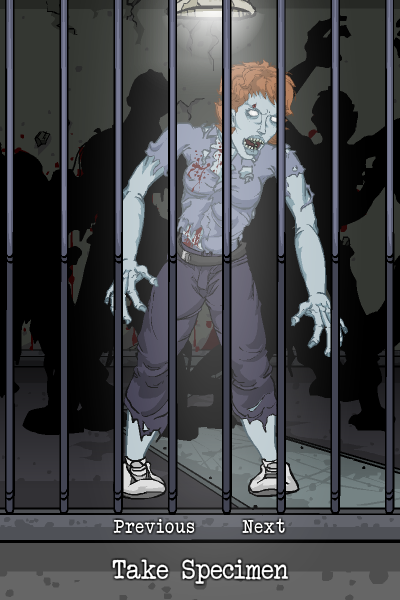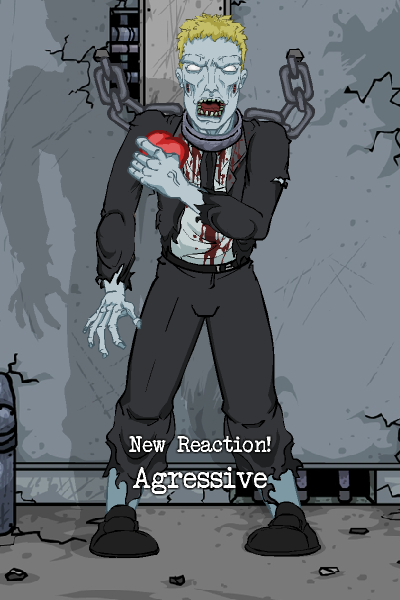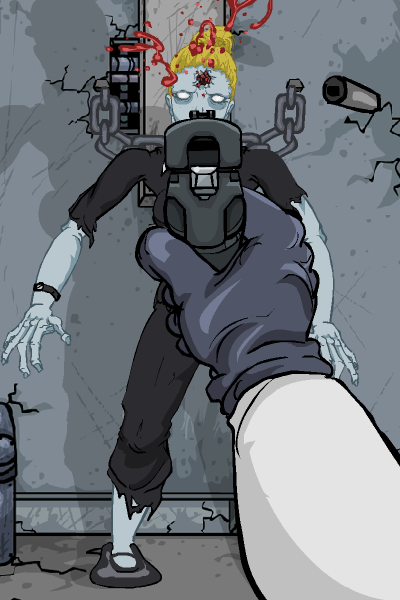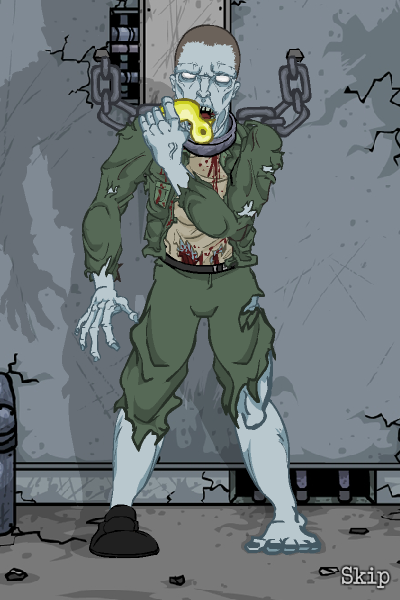Lab of the Dead Dissection: Emotional Connections with the Undead
2012, June 30th 12:58 PMA few weeks ago I ran into a Flash game called Lab of the Dead. I ended up getting far deeper into it than I'd expected, and the damn game wouldn't leave my brain. That's a good sign I should be talking about it.

Lab of the Dead is one of those games that doesn't match any particular genre. You could call it a limited sandbox game, or a puzzle game, or a grind game, or a plot game – it's unclear. The game mechanics are simple. First, you pick a zombie to experiment on, which has almost no influence on the game besides what your test subject looks like. Then you subject the zombie to various items, including anything from shooting it with machine guns, throwing eggs at its face, letting it eat a dead cat, or putting a pair of headphones on it and playing rock music. Depending on the emotional state of the zombie (measured on three scales – "aggression", "hunger", and "humanity"), these various items will result in one of three basic reactions, with a fourth Advanced Reaction that can also depend on what previous reactions the zombie has experienced.
In order to progress the plot, you must experiment on the zombie a certain number of times and discover a certain number of reactions. Progressing the plot unlocks more items that you can use for future experiments. Importantly, there's no way to lose – one could eventually beat the game by clicking randomly.
The most crucial part of the above, however, is that "emotional state" thing I mentioned. Every interaction with your zombie will affect two or three of those scales. Perhaps a squeaky toy will increase their Humanity and reduce their Aggression, perhaps feeding them a dead rat will reduce their Humanity as well as their Hunger. Since the game is gated based on the number of unique reactions you've seen, and since you need to change the scales in order to unlock more reactions, you'll be spending a reasonable amount of your game time trying to do things like increasing your zombie's humanity, or decreasing their aggression, or starving them so they'll attempt to eat a book.

All the reactions have custom animations with appropriately themed behavior. The mid-aggression Live Cat response might result in the zombie attempting to bite the cat. The high-aggression response may have the zombie straight-up disembowel the cat, while the low-aggression zombie may actually pet the cat a few times before the cat runs away. All of this comes coupled with appropriate music and sound effects – I mean, sure, it's still a zombie, but an aggressive zombie's growls tend to be a lot more furious than a passive zombie.
The end result is that you're sitting there spending 15-30 minutes at a time to train a zombie how to pet a cat. No, no, stop eating that mouse, look, let me show you a squeaky duck! See? How about listening to some music, are you feeling better now? Oh, you're getting hungry? Here's some meat I found down in the kitchen.
For a zombie game, it's a surprisingly personal game. I said "you pick a zombie to experiment on, which has almost no influence on the game besides what your test subject looks like," but let's be honest, that's actually a pretty major choice. Your options include half-rotted horrors, schoolgirls, average Joes, you name it. The "choice" segment really immerses you in the zombie's welfare, because out of a whole ton of zombies, you explicitly chose that one. The game's design aims quite directly at establishing an emotional connection between you and your test subject.
Which makes some of the game quite horrifying.
Because, remember, this is – in the end – a test subject. A zombie test subject. And for all that you may want to test the various toys and games you have available, there are also other, less fun items available. Knives. A machete. A shotgun. Grenades. And these items, as well, have to be tested extensively.
You know what happens when you shoot a zombie in the head with a shotgun?
It dies.

And when that's a zombie you've been carefully tending for half an hour, when you've taught that zombie how to play with a Barbie doll and a big stuffed bear, and when you are the one who has to scientifically determine what happens when you systematically fire a pistol into each of its limbs, its torso, and then its head . . .
. . . well, it's kind of a painful game.
Doubly so because of how little the game seems to care about your zombie's death. The main character sighs dramatically about needing another test subject and then it drops you right back at the "choose a zombie" screen. Pick a new test subject and the tests continue. The game considers the zombies completely inhuman, but I found that resulted in me being more aware of their humanity.
I'm definitely not the only one who felt this way. The top comment on Kongregate as of this writing, with a score of over 3000, is asking for the ability to switch zombies without killing your current specimen. I've seen the same suggestion in many other places. And yet, I think providing that would lose a large part of the game's beauty. The game, in its current state, *forces* you to destroy something that you've spent time on, and something that you've acquired history with, for the sake of a nebulous ill-defined long-term goal. The very fact that people are asking so loudly for the ability to switch zombies is, perhaps, a good indication that that ability should not be provided.

One of the things games do badly, and should be working on doing better, is emotional connection. It's a very rare game that leaves you personally invested in the welfare of the characters. I'll admit I hadn't expected to encounter that in a Flash game about experimenting on zombies, but I did, and I'd strongly recommend checking the game out and seeing what makes it emotionally tick.

